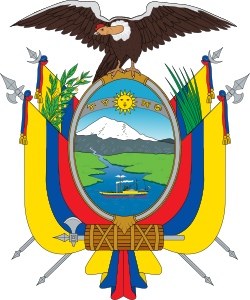 |
|---|
Parliamentary elections were held in Ecuador on 1 June 1994. [1] Only the district members of the House of Representatives were elected. [2] The Social Christian Party emerged as the largest party, winning 23 of the 65 seats up for election. [3]
 |
|---|
Parliamentary elections were held in Ecuador on 1 June 1994. [1] Only the district members of the House of Representatives were elected. [2] The Social Christian Party emerged as the largest party, winning 23 of the 65 seats up for election. [3]
| Party | Votes | % | Seats | |
|---|---|---|---|---|
| Social Christian Party | 810,846 | 26.36 | 23 | |
| Ecuadorian Roldosist Party | 516,268 | 16.78 | 10 | |
| Democratic Left | 306,272 | 9.96 | 6 | |
| Democratic People's Movement | 253,760 | 8.25 | 7 | |
| Popular Democracy | 253,122 | 8.23 | 5 | |
| Ecuadorian Revolutionary Popular Action | 183,383 | 5.96 | 2 | |
| Conservative Party | 172,725 | 5.61 | 6 | |
| Alfarista Radical Front | 144,508 | 4.70 | 1 | |
| Republican Union Party | 120,096 | 3.90 | 1 | |
| Socialist Party | 98,248 | 3.19 | 0 | |
| Concentration of People's Forces | 67,433 | 2.19 | 2 | |
| Ecuadorian Radical Liberal Party | 61,412 | 2.00 | 1 | |
| UDP–FADI | 30,103 | 0.98 | 0 | |
| National Liberation | 27,174 | 0.88 | 1 | |
| Latin American People's Union | 17,445 | 0.57 | 0 | |
| People, Change, Democracy | 11,044 | 0.36 | 0 | |
| Assad Bucaram Party | 2,523 | 0.08 | 0 | |
| Total | 3,076,362 | 100.00 | 65 | |
| Valid votes | 3,076,362 | 76.06 | ||
| Invalid/blank votes | 968,071 | 23.94 | ||
| Total votes | 4,044,433 | 100.00 | ||
| Registered voters/turnout | 6,175,991 | 65.49 | ||
| Source: Nohlen, Hoy | ||||